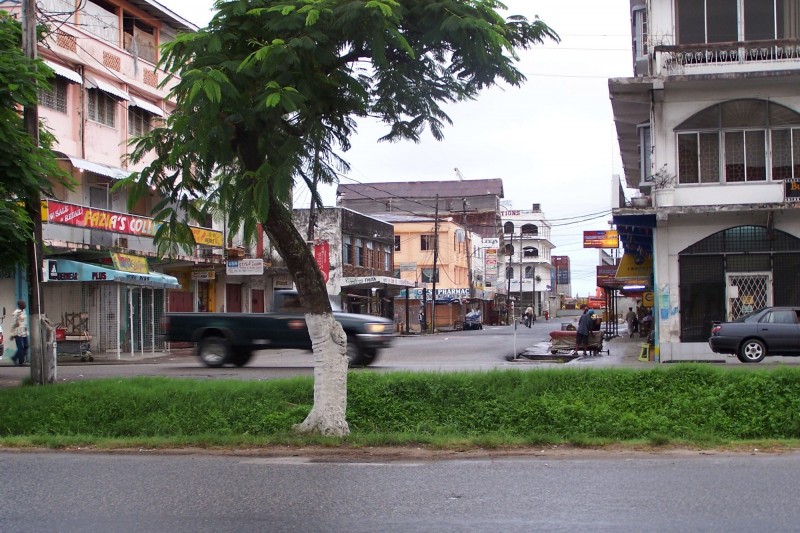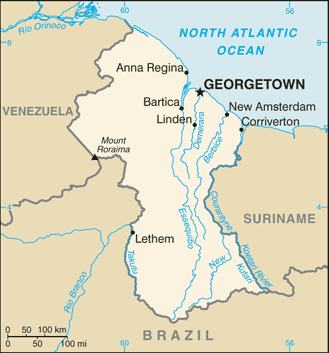Guyana's Acting Foreign Affairs Minister Priya Manickchand has come under fire for sharp comments [2] she directed at outgoing U.S. Ambassador to Guyana D. Brent Hardt during an American independence celebration at his residence in Georgetown.
Manickchand was responding to Hardt's criticism of the ruling People's Progressive Party (PPP) administration for failing to hold local government elections [3] for 20 years. She accused opposition media and diplomatic colleagues of supporting Hardt's “dedicated attack on the president and the government”.
She continued:
Like his President Barack Obama, there exists a red line. This Ambassador has crossed that line. Unlike his President, we are resolved, we have resolved and we so advise our partners, with whom we share conventions and symbiotic relations, this is our red line. Behaviour such as this would not be tolerated within the boundaries of mutual respect, diplomatic relations and inter-government collaboration.
Manickchand's statements drew boos from the audience:
Many commenters used this incident to express their displeasure with the the minister and the People's Progressive Party, which has been in power of the country, one of the poorest in the Western hemisphere, since 1992.
On Facebook, Ruel Johnson responded to a critic [4] who claimed the minister was defending Guyana's sovereignty:
This isn't about fanaticism shown the US. This is about a Minister of Government shamelessly using sovereignty as a weapon against a foreign emissary for calling for the very thing that Guyanese themselves have also been calling, which is local government elections. You might have missed the part where she also took the time to dismiss the efforts of Blue CAPS [5], a group of Guyanese young people. And all that bullshit history lesson to say that the government will continue to ignore the call to hold local government elections.
Ralph Ramkarran, a former PPP stalwart, also critiqued the idea [6]:
Ambassador Hardt has been accused of being disrespectful to the Head of State, President Ramotar, by pointing out what he saw as seeming inconsistencies in his defence of the Constitution. He pointed out that President Ramotar rejected the Local Government Commission Bill on the ground that it is unconstitutional but defends not holding local government elections which violates the Constitution.
By relying on ‘feral’ responses by an invited ‘warrior’ to the Ambassador’s home, the President lost the opportunity of defending his position, which he is quite capable of doing. While the Ambassador’s public remarks about the President’s inconsistencies may not be usual, public figures are expected to defend themselves, which is what the Ambassador no doubt expected.
Ramkarran also referred to a historical incident, involving the PPP's founder and former Guyanese President Dr. Cheddi Jagan:
Guyana has already accepted the precedent for intervention in its internal affairs in relation to elections. In December 1989 Cheddi Jagan, in a letter to President George H. W. Bush, urged his support for free and fair elections in Guyana. President Bush, as if in response but without saying so, expressed the hope to President Hoyte on Republic Day, February 23, 1990, that the elections would be free and fair. The message was repeated by the State Deparment and six Senators later wrote Secretary of State James Baker requesting that US aid be tied to free and fair elections.
President Hoyte’s initial reaction to President Bush’s and the late Senator Edward Kennedy’s letter making the same call was similar to the reaction of our Government now. In fact, President Hoyte said that he had thrown Senator Kennedy’s letter in the garbage. But President Carter then entered the picture and free and fair elections came under direct American tutelege. Apart from national elections, the PPP fought for local government elections since 1970 when they were last held under the [People's National Congress] PNC. If the US is inconsistent, what about Guyana?
The reference to Dr. Cheddi Jagan is significant not only being he was the founder of the PPP but also because when the PPP was first elected in 1953, the colonial authorities of what was then British Guiana suspended the constitution due to their fears of Jagan's leftist leanings. Britain and the United States are also accused of pressuring the PPP into accepting proportional representation during the negotiations for independence in 1963 [8].
It was felt at the time that the PNC (People's National Congress) lead by Forbes Burnham would be a more reliable partner during the Cold War than the PPP. This decision played into the racial dynamics of politics in Guyana: the PPP's base was within the Indo-Guyanese community while the PNC was mainly supported by the Afro-Guyanese population. Many PPP supporters believe that the decision to adopt a system of proportional representation diluted its support and was instrumental in keeping them out of power. This explains why many in the PPP are wary of what they consider to be outside interference in Guyanese politics.
Some on Twitter thought Manickchand's words were undiplomatic:
I used to like Priya Manickchand but she needs to have several seats. She's been so outta control lately! That was NOT the time or place.
— ♔ Sean Rodrigues ♔ (@MrSeanRodrigues) July 3, 2014 [9]
The Government of Guyana owes the US Ambassador, Brent Hardt an apology. That's all.
— ♔ Sean Rodrigues ♔ (@MrSeanRodrigues) July 3, 2014 [10]
Priya Manickchand's behaviour towards US Ambassador D Brent Hardt proves she has no diplomacy. #politicians [11] #guyana [12]
— Samuel Sukhnandan (@timothygy) July 3, 2014 [13]
The leader of the opposition, David Granger, has called for Manickchand to apologize [14] for her statements along with the third largest political party Alliance For Change (AFC).

